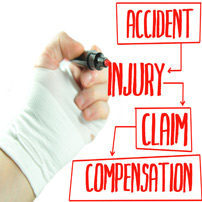The Dangers of Being Distracted at Work
January 18, 2018 It should come as no surprise that not only is distracted driving grossly unsafe, but so is being distracted in the workplace – especially for individuals employed in certain industries known for being hazardous. Although most people know that distracted driving causes thousands of injuries and fatalities every year, they may be unaware of just how often distraction plays a key role in workplace injuries and fatalities.
It should come as no surprise that not only is distracted driving grossly unsafe, but so is being distracted in the workplace – especially for individuals employed in certain industries known for being hazardous. Although most people know that distracted driving causes thousands of injuries and fatalities every year, they may be unaware of just how often distraction plays a key role in workplace injuries and fatalities.
According to a publication from the National Safety Council (NSC), there are a few different kinds of distractions that most often contribute to workplace injuries and deaths. For employees in manufacturing and production jobs, accident investigators often find that pressure to make looming deadlines or meet departmental quotas can increase the chances of someone being distracted. Even when a person rushes to power through a task and get the job done it takes his or her brain off of what should be the primary task at hand: staying safe in the workplace as well as being efficient.
Researchers say that people don’t just get distracted when they’re rushing through a task to get done quickly, meet a deadline or straining to meet a workplace goal but also when they fall into the routine of work, “zone out” or become complacent. People who perform repetitive workplace tasks may be particularly prone to this type of distraction, which is often inadvertent and simply a consequence of increasing familiarity. Although it’s easy to believe that injuries won’t happen because one may not have occurred yet, it’s crucial to remember that injuries can always happen and to stay alert.
Another big kind of distraction is mental distraction, or when someone’s mind is elsewhere. We’ve all had a day that felt like we woke up on the wrong side of the bed, but being in that mindset can actually contribute to a dangerous or deadly accident. Even listening to music while working can be hazardously distracting, as well as taking a phone call, eating, drinking or texting.
There are lots of ways that employers and administrators can – and should – step in to ensure that workplace distractions are limited and that employees are safe. Researchers find that giving frequent short breaks, or “micro breaks,” is a very effective way to allow workers to recharge and refocus. These micro breaks are only a few minutes long, but give workers the chance to take a short walk or stretch. Some researchers also suggest organizing the workday into different stages to increase focus, instead of structuring it around one continuous task.
Another way to limit workplace distractions is for supervisors and employers to ensure that all equipment functions properly. This can be as simple as making sure a printer isn’t always getting jammed to something as potentially hazardous as ensuring that a particularly finicky power tool isn’t having the same electrical problem that it always does. When employers adequately maintain all workplace equipment, workers can better avoid injury-causing distractions linked to troubleshooting and malfunctioning equipment.
What else can employers do to decrease distractions that put workers at risk for serious injury and death? Here are a few more tips from the NSC’s publication:
- Supervise employees routinely and be aware of behavioral shifts – this way, if an employee appears distracted he or she can be given a break or another appropriate course of action can be taken;
- Consider disallowing music players while on the job;
- Ban the use of cell phones unless an employee is on a break (and make sure that family members and loved ones of workers are given the telephone number for the workplace in the case of an emergency), and;
- Offer safety trainings or awareness programs that discuss the dangers of work distraction – and remind employees to report any problems they observe
While it’s unclear just how many workplace accidents, injuries and deaths are the result of distraction, both the NSC and researchers across the country know that it’s crucial to limit this serious work hazard. The Bureau of Labor Statistics (BLS) estimates that nearly 3 million nonfatal workplace injuries occurred in 2016 – and that almost 5,200 workers died in fatal accidents that same year. The safety of workers always needs to be a priority for all employers and supervisors, but if you became injured or ill as a result of inadequate safety measures in your workplace, please contact a representative at our firm.
Philadelphia Workers’ Compensation Lawyers at Galfand Berger, LLP Represent Individuals Injured on the Job
If you were injured because of safety failures in the workplace, please contact our Philadelphia Workers’ Compensation lawyers at Galfand Berger. With offices located in Philadelphia, Bethlehem, Lancaster, and Reading, we serve clients throughout Pennsylvania and New Jersey. To schedule a consultation, call us at 800-222-8792 or complete our online contact form.
 Google Screened
Google Screened
